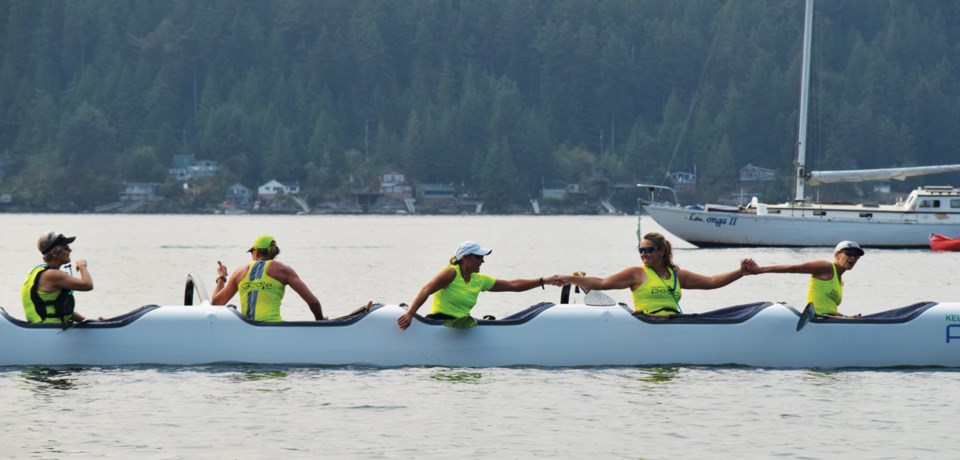The 2018 Howe Sound Iron Canadian Championship Outrigger Races were held last weekend in truly Gibsons fashion. More than 300 paddlers participated this year including clubs from Oregon, Seattle, San Francisco, Calgary, Comox, the Fraser Valley, Okanagan, Vancouver Island, Powell River and, of course, Gibsons.
The races were enjoyed by many at the start and finish line at Armours Beach – a great spectacle for the multitude of fans and visitors who were in town for the many events this past weekend.
The OC-6’s (six-person canoes) raced Saturday Aug. 18, both in the 14-kilometre short course, circumnavigating Keats Island, and the 23-kilometre long course, up to Bonniebrook and then around Keats. More than 50 teams participated on Saturday, and 48 on the Sunday in the 10-kilometre 0C-2 (two-person canoe) race. RCMSAR 14, the local marine search and rescue boat and crew, provided support as escorts for each race. Another support boat was provided by Charlie Greenaway.
Among the paddlers who participated are world-class athletes who competed in the World Sprints in Tahiti: Kelowna’s Leanne Stanley, who won gold in the V1 category, Comox’s Don Irvine, several Powell River women who competed in the golden masters category, Seattle’s Alan Goto and Tamas Mihali of Gibsons. Goto and James Hill raced in the OC-2 category finishing with a time of 46:58, beating the 2016 fastest time of 48:30.
Paddling an outrigger canoe takes more than just muscle. It takes coordination and focus, with six paddlers working as one. Consequently, when bodies and minds come together, the 40-foot, 400-pound 0C-6 glides forward seemingly effortlessly. And the sport continues to evolve with changing technology in crafting faster and sleeker carbon fibre boats. This was on full display last weekend, with many ultralight canoes transported to Gibsons, weighing only 150 pounds and valued at more than $35,000 each. Those boats continue to smash records for times in the OC-6 category and small boat categories.
The event kicked off Friday evening with a traditional First Nations welcome and blessing by Wes Nahanee, cultural ambassador from the Skwxwú7mesh Nation. He provided local history of the Sunshine Coast First Nations peoples, and the importance of the canoe to First Nations culture. Nahanee’s heritage also includes Hawaiian blood, and he spoke about the importance of Ohana – that all paddlers embrace the spirit of family and togetherness and cooperate and remember one another. Local artist Ed Hill performed a necklace ceremony in which every paddler was gifted a necklace made with locally grown and traditionally harvested devil’s club. The necklace is believed to keep paddlers safe on the water and is recognized worldwide, putting Gibsons on the world map for its spirit of Ohana. When the time is right, each paddler will gift his or her necklace to another paddler, spreading the spirit of Ohana, one family.
A race of this magnitude could not occur without a community spirit behind it. Organizers are grateful to the Town of Gibsons and Gibsons Marina for their support, the many local merchants who provided prizes, and all the volunteers including the cast from Gibsons Paddle Club who live the consummate mantra, “Many hands make light work.”
Organizers look forward to hosting the Canadian Championships again in 2020. Mahalo and Aloha Nui!
– Tammy Hartmann



